Watering
“THE WINKIE WAY”
“If you can grow Tomatoes you can grow Dahlias”
Dahlias have been watered successfully using a number of methods.
Traditionally they have been watered with a hand held hose, deep furrow watering, drippers, low level sprays, overhead sprinklers etc.
For years I used overhead sprinklers and more recently with drippers.
When water restrictions were introduced our water allocation was cut back to 17%.
This resulted in looking for alternative efficient ways to deliver water to the Dahlias.
The Almond Industry was using water very efficiently with a method called “Pulse Watering”.
“Pulse Watering” was adopted and now it has now been fine tuned to suit Dahlias.
Adopting “Pulse Watering” our plants are better than ever before, even through the hottest Days.
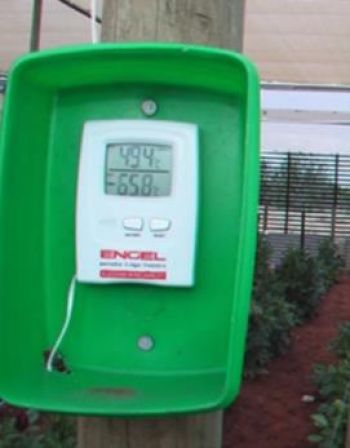
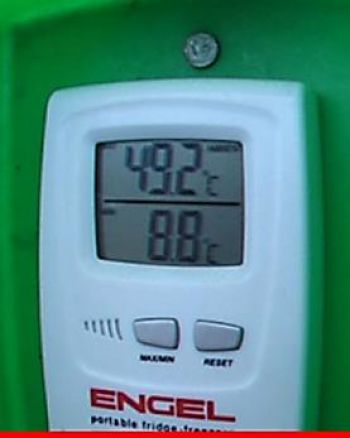
It was a Hot Growing Season
At Winkie in 2008 there were 18 days over 40C
And 25 days over 35C
With three days in a row over 48C+ Recorded in the patch
Even though we had a hot December & January we had the best Dahlias for many years.
Pulse Watering
What is It?
Pulse watering is the application of water little and often providing
“Critical Available Water”
Water is applied up to six times a Day.
“Little & Often”
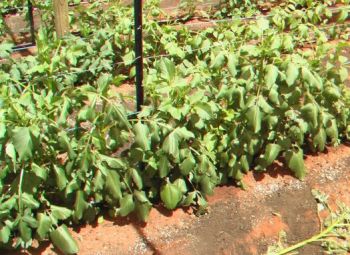
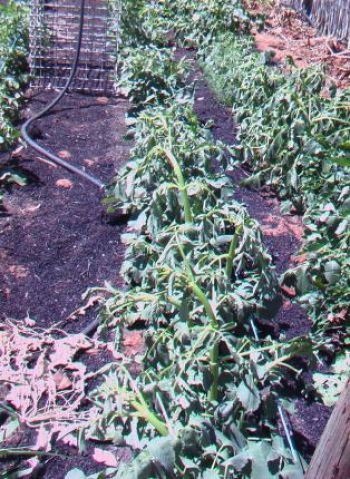
Seeing stressed plants like these are now a thing of the past
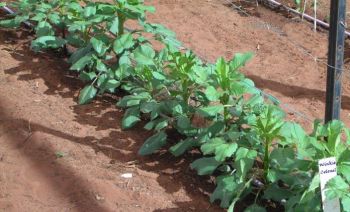
After adopting “Pulse Watering”
This picture was taken mid-afternoon on a 45C Day
Pulse Watering reduces the Stress
My experience of growing Dahlias for the last 30+ years has used a number of methods of irrigating/watering the plants.
With the introduction of water restrictions alternatives were investigated & fine-tuned.
Traditional water requirements for Dahlias advocated in a number of publications that a Dahlia Plant needs up to 2 gallons of water per plant per day =Nine Litres.
Each plant now receives a total of 2.8 litres (0.6 of a Gallon) per week.
I Have tried Various Watering Systems over the years
Furrow/Flood Watering
Overhead sprays
Low level sprays
Drippers
Hand held hose
Water Restrictions were introduced
- With only 17% of our Water Allocation allowed we were forced to seek an alternative.
- It was observed the Almond Growers had adopted “Pulse Watering” & it saved their trees along with the crop.
What is Pulse Watering?
Pulse watering is the application of water little and often providing “Critical Available Water”
Water is applied up to six times a Day for two minutes at a time.
The thought of this was horrifying but it had been applied successfully in other crops in the Riverland.
“Pulse Watering” was adopted as an alternative because there was no other option.
Most Controllers are easily programmed to come on six times a day for two minutes at a time.
These cost approx. $30 - $40
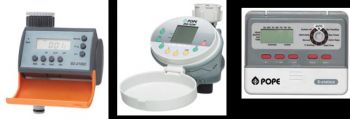
The controllers pictured are battery operated & do not need solenoid valves and associated wiring.
I use an eight Station Garden Controller.
Dripper Hose
Pressure Compensated Dripper Hose with an emitter every 300mm (12 Inches) was installed.
Each dripper delivers two litres of water/hour.
Water is applied six times/day for two minutes at a time, each dripper delivered approx. 400ml of water per plant/per day. At: - 8.00am – 11.00am – 1.00pm – 3.00pm – 5.00pm – 8.00pm.
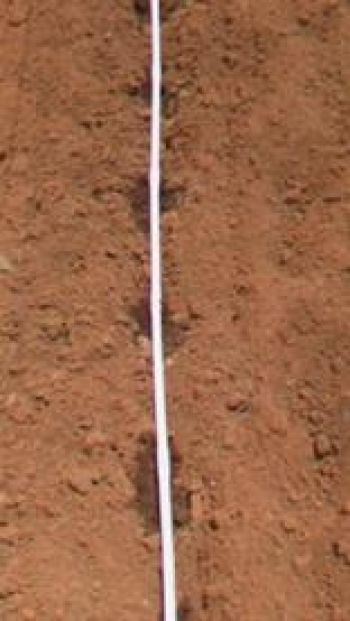
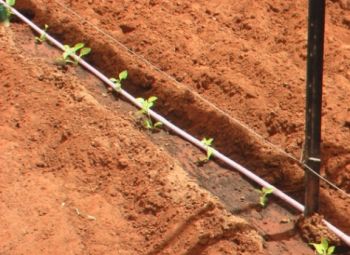
There is a plant at each dripper.
The Pressure Compensated Dripper Hose delivers water equally across the irrigated area
The Pulsing of the Water six times a day replicates a mini wetting & drying process.
This process actually works like a horizontal wick drawing the water horizontally.
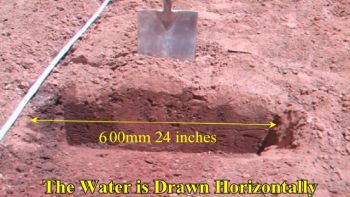
The moisture is predominately in the top 400mm (16 inches) right where the plant needs it.
Not vertically like a tear drop pattern when drippers are left on for long periods.
The distribution of water was right across the rows, right in the Root Zone.
Our Rows are 1.2 Mt (4’) apart & the water actually meets in the middle of the row 25mm (one inch) below the surface.
This has assisted in the development of a good root system that assists the resilience of the plant on those hot days.
The plants show far less stress on those hot days, than with conventional watering methods.
Pulse Watering
With “Pulse Watering” we had virtually no loss of fertilizer being leached through the root zone out of reach of the plant.
Water savings are approx. 70% compared with what we applied in previous years.

This resulted in us having a great season with excellent blooms under the very trying conditions.
Pulse Applications are extremely effective because it:-
- Applies water to the right place.
- Water soaks into the Root Zone.
- Provides Critical Available Water.
- No water lost to the lower soil profile.
- No Leaching of Fertilizers.
- Reduced bud burn & tip burn.
- 70% water Savings.
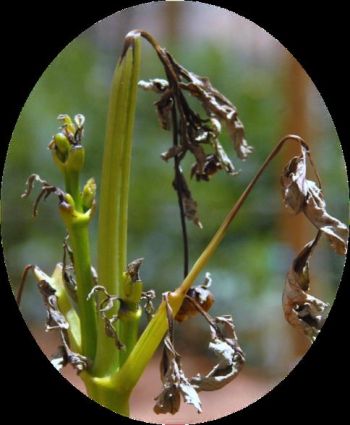
With conventional watering methods the Growing Tips would have been totally lost.
After three consecutive days of 48C/49C was there was some burn on the blooms.
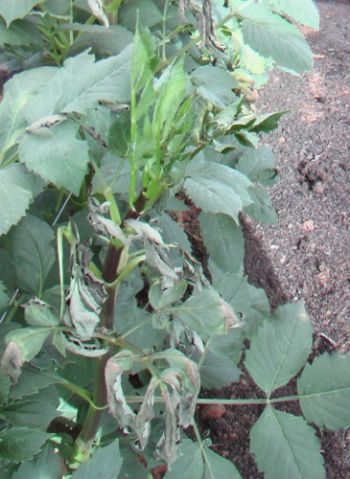
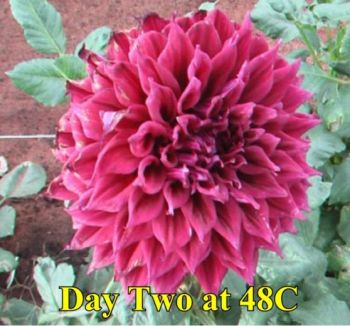
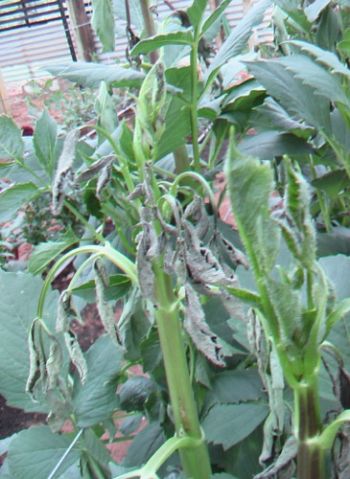
After Three Days 48C/49C the growing tips continued Growing.
There was some damage to the larger leaves but the growing tips were fine resulting in the developing buds reaching maturity in good condition.
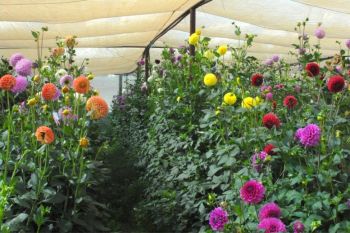
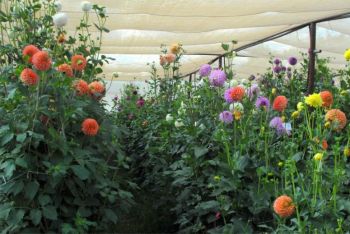
The Patch Late-March
Thanks to the results of Pulse Watering.
Providing Water at the CRITICAL Time is the answer.
“Pulse Watering” can be easily adopted in the home garden in the smallest of Dahlia Patches.
It is also good for most vegetable crops, fruit trees, vines & roses.
Enquiries and comments to
John Menzel-
john@winkiedahlias.com
08- 85837369 0408 837369